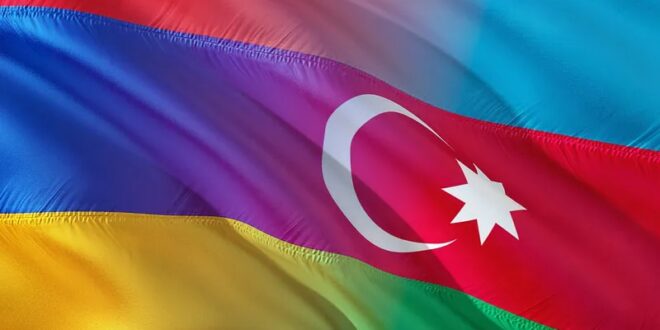(RFE/RL) — After weeks of bloody clashes, Azerbaijan on September 19 said it had launched an “anti-terrorist operation” in Nagorno-Karabakh, a major escalation in hostilities with Armenia as the breakaway region already teeters on the brink of a humanitarian crisis after being blockaded for more than eight months.
The shelling — which triggered an immediate international outcry — started shortly after Baku accused what it called “Armenian sabotage groups” for the two separate explosions that killed four military personnel and two civilians in areas of Nagorno-Karabakh that are under the control of Russian peacekeepers.
Ethnic Armenians inside Nagorno-Karabakh quickly took to social media with posts of video and accounts saying the de facto capital, Stepanakert, was under bombardment. There were no immediate details on damage or casualties.
Azerbaijan’s Defense Ministry said in a statement that “only legitimate military targets are being destroyed,” while the Foreign Ministry said the only way for peace in the region was the complete withdrawal of Armenian forces in the region.
Armenia’s Defense Ministry, however, disputed Baku’s statement, saying the country had no forces in Nagorno-Karabakh and that Baku’s offensive “violated the cease-fire along the entire line of contact with missile-artillery strikes.”
Later in the day, Azerbaijan’s Defense Ministry said in a statement that Azerbaijani forces had so far seized more than 60 military posts and destroyed up to 20 military vehicles with other hardware.
The de facto human rights ombudsman in the ethnic Armenian-controlled Azerbaijani region said that two civilians had been killed and 23 wounded — including at least eight children — in the attacks.
Prime Minister Nikol Pashinian immediately convened a meeting of the country’s Security Council and said he was looking toward Moscow, which leads a military security alliance Armenia is a part of, and the international community, to help put a stop to Baku’s attacks.
“First of all, Russia must take steps and, secondly, we expect the UN Security Council to also take steps,” Pashinian said in televised comments.
In the evening, angry crowds gathered outside government buildings in Yerevan, calling for Pashinian to resign, and clashed with police, RFE/RL’s Armenian Service reported.
Protesters angry by what they saw as Moscow’s failure to stop Azerbaijan also gathered outside the Russian Embassy in Yerevan, chanting anti-Russian slogans, TASS reported.
U.S. Secretary of State Antony Blinken called on Azerbaijan to halt its operation immediately, saying it was worsening an already dire humanitarian situation in Karabakh.
“The United States is deeply concerned by Azerbaijan’s military actions in Nagorno-Karabakh and calls on Azerbaijan to cease these actions immediately,” Blinken said in a statement.
Earlier, Armenia’s Foreign Ministry said in a statement that Russian peacekeeping troops stationed in Nagorno-Karabakh will take “clear and unequivocal steps to stop Azerbaijan’s aggression,” referring to the cease-fire agreement Moscow brokered between Yerevan and Baku after the two sides fought a six-week war in late 2020 over the region, leaving some 7,000 people dead.
Russian Foreign Ministry spokeswoman Maria Zakharova told journalists in Moscow that Russia was worried by the escalation but that its peacekeepers in the region would continue their mission. She added that Moscow had only “several minutes” notice before Baku launched its offensive.
“The most important thing is to convince both Yerevan and Baku to reject using force and sit down at the negotiating table,” Kremlin spokesman Dmitry Peskov said.
The European Union’s top diplomat, Josep Borrell, condemned the operation and called on Azerbaijan to stop military activities in Nagorno-Karabakh, while saying Brussels remained committed to facilitating dialogue to bring a lasting peace to the region.
Armenia’s government said in a statement that French President Emmanuel Macron told Pashinian in a phone call that he will call for an emergency meeting of the UN Security Council over the situation. Reuters quoted U.S. officials as saying Washington had already started a diplomatic outreach over the situation.
Nagorno-Karabakh-based independent journalist Marut Vanian confirmed to RFE/RL that Azerbaijan had “intensively” shelled the region.
“From my balcony I could see smoke rising from the direction of Shushi [known as Susa in Azerbaijani]. From my balcony I could hear sounds of explosions coming from different directions…. Several explosions were very close,” Vanian said, adding that the shelling had sent many families scrambling for cellars and shelters.
Metakse Hakobian, the secretary of the opposition “Justice” faction of Nagorno-Karabakh’s de facto parliament, told RFE/RL that Stepanakert was “being bombarded from all sides.”
Artak Beglarian, former minister and and ex-ombudsman of Nagorno-Karabakh, called the attacks “the bloody stage of the genocide” of Nagorno-Karabakh people and called onRussia, the United States, and the European Union to stick to their guarantees for peace and security in the breakaway region.
The situation escalated in the region just one day after humanitarian aid delivery for ethnic Armenians in Nagorno-Karabakh resumed after Nagorno-Karabakh’s de facto authorities agreed to allow Russian-provided aid to be delivered directly from Baku-controlled territory via the Agdam road.
In return, Azerbaijani authorities agreed to allow simultaneous aid deliveries to the breakaway region through the Lachin Corridor.
U.S. and European leaders have called for Azerbaijan to ease the transit of humanitarian aid to the beleaguered region, which is experiencing shortages of food, energy, and medicine.
Armenia and Azerbaijan have fought two wars over Nagorno-Karabakh, a predominantly Armenian-populated mountainous enclave that is internationally recognized as part of Azerbaijan.
The cease-fire signed at the end of the 2020 conflict was hailed as a triumph in Azerbaijan, but Armenian losses sparked months of massive protests in Yerevan demanding Prime Minister Nikol Pashinian’s resignation.
Nagorno-Karabakh and seven nearby regions had been controlled by ethnic Armenians since a bitter war began as the Soviet Union crumbled in the late 1980s and then gave way to a three-decade “frozen conflict.”
 Eurasia Press & News
Eurasia Press & News



